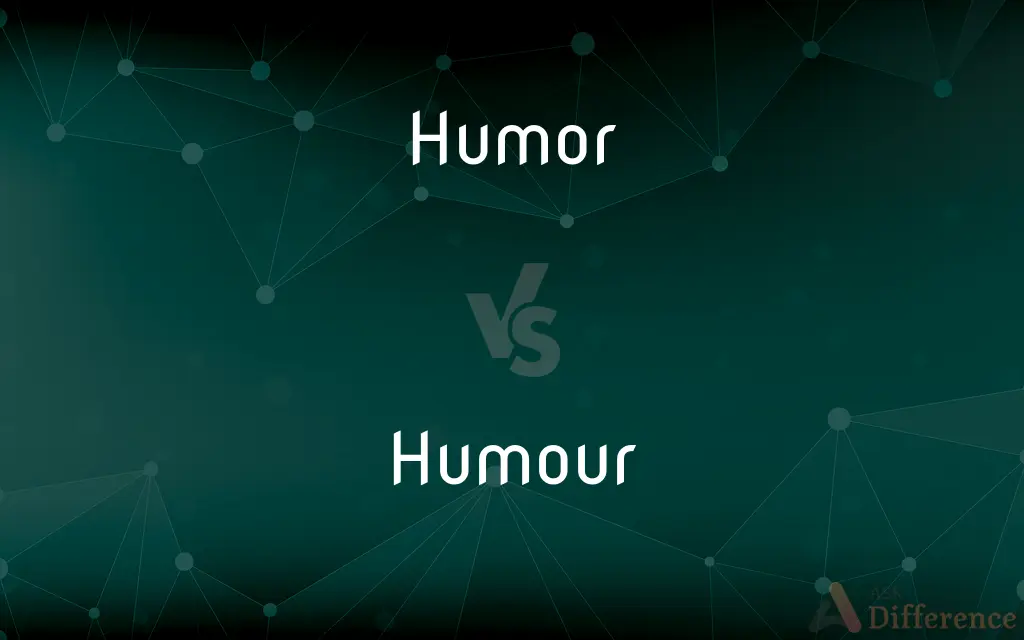Humor vs. Humour — What's the Difference?
By Tayyaba Rehman & Urooj Arif — Updated on April 3, 2024
"Humor" is the American English spelling, focusing on comedy and amusement, whereas "Humour" is the British English variant, sharing the same meanings.

Difference Between Humor and Humour
Table of Contents
ADVERTISEMENT
Key Differences
The distinction between humor and humour primarily lies in their spelling and the variant of English in which they are used. While "humor" is preferred in American English, "humour" is used in British English and its derivatives. This difference is a result of the broader divergences between American and British English, which include variations in spelling, pronunciation, and occasionally usage.
Both terms, irrespective of spelling, play a significant role in culture and communication. They underscore the importance of laughter, joy, and the lighter side of life in connecting people. Comedy, satire, and wit, encapsulated by these terms, are vital components of human expression, transcending cultural and linguistic barriers to bring people together.
Despite the spelling differences, the essence of humor and humour remains the same: to evoke laughter and provide entertainment. This commonality demonstrates the flexibility of the English language and its ability to adapt and evolve across different regions and cultures. Whether it's humor or humour, the ability to make others laugh and the appreciation of comedy are universally valued traits.
In essence, humor and humour represent the same concept seen through the lens of linguistic variation. They exemplify how language evolves and adapts to different cultural contexts, all the while maintaining the core human desire for laughter and amusement.
Comparison Chart
Spelling
American English spelling.
British English spelling.
ADVERTISEMENT
Usage
Preferred in the United States.
Used in the UK, Canada, Australia, and other Commonwealth countries.
Linguistic Tradition
Reflects American English's preference for simpler spellings.
Reflects the historical depth of British English.
Cultural Significance
Central to entertainment and daily life.
Similarly vital in cultures using British English.
Core Essence
Elicits laughter and amusement.
Same as humor, focusing on comedy and the lighter side of life.
Compare with Definitions
Humor
Anything related to being funny or comical.
The movie's humor appealed to all ages.
Humour
Key in British literature and media.
British novels are celebrated for their wit and humour.
Humor
Reflects cultural preference for simpler spellings.
The spelling humor exemplifies American English's efficiency.
Humour
British English variant for comedy and amusement.
British humour often includes irony and understatement.
Humor
Universal appreciation in the U.S.
Everyone appreciates good humor during difficult times.
Humour
Used where British English prevails.
In Canada, humour is the preferred spelling in publications.
Humor
Prominent in everyday American conversation.
Sharing a sense of humor strengthens friendships.
Humour
Reflects linguistic traditions of British English.
The spelling humour maintains its historical complexity.
Humor
Widely used in American entertainment.
American sitcoms are known for their unique sense of humor.
Humour
Shared global understanding of laughter.
Humour bridges cultural differences effortlessly.
Humor
The quality that makes something laughable or amusing; funniness
Could not see the humor of the situation.
Humour
Humour (Commonwealth English) or humor (American English) is the tendency of experiences to provoke laughter and provide amusement. The term derives from the humoral medicine of the ancient Greeks, which taught that the balance of fluids in the human body, known as humours (Latin: humor, "body fluid"), controlled human health and emotion.
Humor
That which is intended to induce laughter or amusement
A writer skilled at crafting humor.
Humour
The quality of being amusing or comic, especially as expressed in literature or speech
His tales are full of humour
Humor
The ability to perceive, enjoy, or express what is amusing, comical, incongruous, or absurd
"Man's sense of humor seems to be in inverse proportion to the gravity of his profession" (Mary Roberts Rinehart).
Humour
A mood or state of mind
Her good humour vanished
The clash hadn't improved his humour
Humor
Aqueous humor.
Humour
Comply with the wishes of (someone) in order to keep them content, however unreasonable such wishes might be
She was always humouring him to prevent trouble
Humor
Vitreous humor.
Humour
Variant of humor.
Humor
A person's characteristic disposition or temperament
A boy of sullen humor.
Humour
(uncountable) The quality of being amusing, comical, funny.
She has a great sense of humour, and I always laugh a lot whenever we get together.
The sensitive subject was treated with humour, but in such way that no one was offended.
Humor
An often temporary state of mind; a mood
I'm in no humor to argue.
Humour
(uncountable) A mood, especially a bad mood; a temporary state of mind or disposition brought upon by an event; an abrupt illogical inclination or whim.
He was in a particularly vile humour that afternoon.
Humor
A sudden, unanticipated inclination; a whim.
Humour
(obsolete) Moist vapour, moisture.
Humor
Capricious or peculiar behavior.
Humour
(transitive) To pacify by indulging.
I know you don't believe my story, but humour me for a minute and imagine it to be true.
Humor
To comply with the wishes or ideas of (another) in order to keep that person satisfied or unaware of criticism; indulge
"When she was convinced a man was giving her the eye, we humored her and agreed" (Jhumpa Lahiri).
Humour
Same as humor.
Humor
To adapt or accommodate oneself to
Humored his uncle's peculiarities.
Humour
A characteristic (habitual or relatively temporary) state of feeling;
Whether he praised or cursed me depended on his temper at the time
He was in a bad humor
Humor
Alternative spelling of humour
He was in a particularly vile humor that afternoon.
Humour
A message whose ingenuity or verbal skill or incongruity has the power to evoke laughter
Humor
Alternative spelling of humour
I know you don't believe my story, but humor me for a minute and imagine it to be true.
Humour
The liquid parts of the body
Humor
Moisture, especially, the moisture or fluid of animal bodies, as the chyle, lymph, etc.; as, the humors of the eye, etc.
Humour
The quality of being funny;
I fail to see the humor in it
Humor
A vitiated or morbid animal fluid, such as often causes an eruption on the skin.
Humour
The trait of appreciating (and being able to express) the humorous;
She didn't appreciate my humor
You can't survive in the army without a sense of humor
Humor
State of mind, whether habitual or temporary (as formerly supposed to depend on the character or combination of the fluids of the body); disposition; temper; mood; as, good humor; ill humor.
Examine how your humor is inclined,And which the ruling passion of your mind.
A prince of a pleasant humor.
I like not the humor of lying.
Humour
Put into a good mood
Humor
Changing and uncertain states of mind; caprices; freaks; vagaries; whims.
Is my friend all perfection, all virtue and discretion? Has he not humors to be endured?
Humor
That quality of the imagination which gives to ideas an incongruous or fantastic turn, and tends to excite laughter or mirth by ludicrous images or representations; a playful fancy; facetiousness.
For thy sake I admitThat a Scot may have humor, I'd almost said wit.
A great deal of excellent humor was expended on the perplexities of mine host.
Humor
To comply with the humor of; to adjust matters so as suit the peculiarities, caprices, or exigencies of; to adapt one's self to; to indulge by skillful adaptation; as, to humor the mind.
It is my part to invent, and the musician's to humor that invention.
Humor
To help on by indulgence or compliant treatment; to soothe; to gratify; to please.
You humor me when I am sick.
Humor
A message whose ingenuity or verbal skill or incongruity has the power to evoke laughter
Humor
The trait of appreciating (and being able to express) the humorous;
She didn't appreciate my humor
You can't survive in the army without a sense of humor
Humor
A characteristic (habitual or relatively temporary) state of feeling;
Whether he praised or cursed me depended on his temper at the time
He was in a bad humor
Humor
The quality of being funny;
I fail to see the humor in it
Humor
The liquid parts of the body
Humor
Put into a good mood
Common Curiosities
Are humor and humour interchangeable?
Yes, they are interchangeable in meaning but used differently based on the English variant.
Why does American English use "humor"?
American English prefers "humor" due to a cultural preference for simpler spellings.
Can humor and humour be used in formal writing?
Yes, both can be used in formal writing, depending on the variant of English being followed.
What is the main difference between humor and humour?
The main difference lies in the spelling: "humor" is American English, while "humour" is British English.
Is British humour different from American humor in content?
While there can be stylistic differences, the essence of making people laugh remains the same.
Is it correct to use "humour" in the United States?
It's not typical, but understandable, though "humor" is the preferred spelling.
Do humor and humour have the same effect on audiences?
Yes, both aim to evoke laughter and amusement, regardless of the spelling.
Why is humour spelled with a "u" in British English?
The "u" reflects the historical depth and linguistic traditions of British English.
How do humor and humour contribute to culture?
They play a vital role in entertainment, social interaction, and emotional well-being.
Are there any genres where humor/humour is particularly important?
Comedy, satire, and certain types of drama heavily rely on humor/humour.
How do digital platforms treat humor and humour?
Digital platforms adapt to the language preferences of their audience, using the appropriate spelling.
Can the use of humor or humour indicate a writer's origin?
Yes, the spelling can suggest whether a writer uses American or British English.
Are there educational uses for humor and humour?
Yes, they're used in educational contexts to engage students and enhance learning experiences.
Do humor and humour have psychological benefits?
Both have significant psychological benefits, including stress relief and improved mood.
Has the globalization of media affected the use of humor and humour?
Yes, global media blends American and British English, making audiences familiar with both spellings.
Share Your Discovery

Previous Comparison
Fap vs. Wap
Next Comparison
Phosphate vs. PhosphorusAuthor Spotlight
Written by
Tayyaba RehmanTayyaba Rehman is a distinguished writer, currently serving as a primary contributor to askdifference.com. As a researcher in semantics and etymology, Tayyaba's passion for the complexity of languages and their distinctions has found a perfect home on the platform. Tayyaba delves into the intricacies of language, distinguishing between commonly confused words and phrases, thereby providing clarity for readers worldwide.
Co-written by
Urooj ArifUrooj is a skilled content writer at Ask Difference, known for her exceptional ability to simplify complex topics into engaging and informative content. With a passion for research and a flair for clear, concise writing, she consistently delivers articles that resonate with our diverse audience.















































